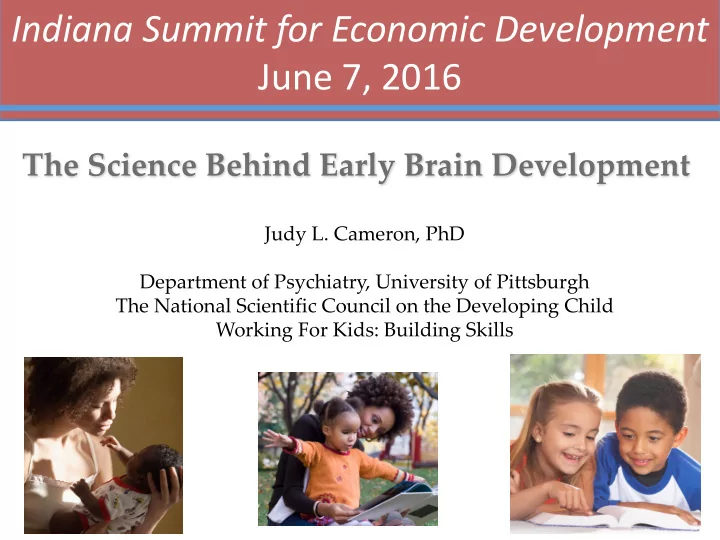

Indiana ¡Summit ¡for ¡Economic ¡Development June ¡7, ¡2016 The ¡Science ¡Behind ¡Early ¡Brain ¡Development ¡ Judy ¡L. ¡Cameron, ¡PhD Department ¡of ¡Psychiatry, ¡University ¡of ¡Pittsburgh The ¡National ¡Scientific ¡Council ¡on ¡the ¡Developing ¡Child Working ¡For ¡Kids: ¡Building ¡Skills
The ¡Foundation ¡of ¡a ¡Successful ¡Society ¡ is ¡Built ¡in ¡Early ¡Childhood Successful Parenting of Next Generation Educational Economic Responsible Lifelong Achievement Productivity Citizenship Health
Four ¡Core ¡Concepts ¡of ¡Development 1 Brain Architecture Is Established Early in Life and Supports Lifelong Learning, Behavior, and Health 2 Stable, Caring Relationships and “Serve and Return” Interaction Shape Brain Architecture 3 Toxic Stress in the Early Years of Life Can Derail Healthy Development 4 Resilience can be Built through “Serve and Return” Relationships, improving Self- Regulation, and Executive Functions.
TM Working for Kids: Building Skills MOTHER’S SPEECH AND CHILD VOCABULARY Source: Huttenlocher et al., Developmental Psychology 27: 236-248, 1991 800 Vocabulary Size (Words) 600 400 200 0 12 14 16 18 20 22 24 26 Age in Months High level of Mother’s Speech Medium level of Mother’s Speech www.workingforkids.com Low level of Mother’s Speech
Experiences ¡Build ¡Brain ¡Architecture
Serve ¡& ¡Return ¡Relationships ¡ Support ¡Skill ¡Learning
Serve ¡& ¡Return ¡Relationships ¡Buffer The ¡Developing ¡Brain
Supportive Environments for Brain Development t n e S m e e l f g - C a o g n n fj E d e n c e t s e r e t n I T R SUPPORT U S T CARE TM Working for Kids: Building Skills
Early ¡Life ¡Stress ¡Impacts ¡Life-‐‒long ¡ Health ¡and ¡Development
Sources ¡of ¡Toxic ¡Stress ¡in ¡Young ¡Children 130 136 U.S. Children Ages 2-5 (per 1,000) 75 Maltreatment Postpartum Depression Parental Substance Abuse Source: O-Hara & Swain Source: SAMHSA (2009) Source: Finkelhor et al. (1996) (2005) NEGLECT
What are ¡the ¡Long-‐‒term ¡Impacts ¡of ¡ Toxic ¡Stress ¡in ¡Early ¡Life? ¡
Categories ¡of ¡Adverse ¡Childhood ¡Experiences Prevalence ¡(%) Abuse, ¡by ¡Category Psychological ¡(by ¡parents) 11% Physical ¡(by ¡parents) 28% Sexual ¡(anyone) 22% Forms ¡of ¡Neglect ¡and ¡Household ¡Dysfunction Emotional 15% Physical 10% Alcoholism ¡or ¡drug ¡use ¡in ¡home ¡ ¡ ¡ ¡ ¡ ¡ ¡ ¡ ¡ ¡ ¡ ¡ ¡ ¡ ¡ ¡ ¡ ¡ ¡ ¡ ¡ ¡ ¡ ¡ ¡ ¡ ¡ ¡ ¡ ¡ ¡ ¡ ¡ ¡ ¡ ¡ ¡ ¡ ¡ ¡ 27% Loss ¡of ¡biological ¡parent ¡<18 ¡ ¡ ¡ ¡ ¡ ¡ ¡ ¡ ¡ ¡ ¡ ¡ ¡ ¡ ¡ ¡ ¡ ¡ ¡ ¡ ¡ ¡ ¡ ¡ ¡ ¡ ¡ ¡ ¡ ¡ ¡ ¡ ¡ ¡ ¡ ¡ ¡ ¡ ¡ ¡ ¡ ¡ ¡ ¡ 23% Depression ¡or ¡mental ¡illness ¡in ¡home 17% Mother ¡treated ¡violently 13% Imprisoned ¡household ¡member 5%
Significant ¡Adversity ¡Impairs ¡ Development ¡in ¡the ¡First ¡Three ¡Years Developmental Delays 100% Children with 80% 60% 40% 20% 1-2 3 4 5 6 7 Number of Risk Factors Source: Barth, et al. (2008)
Risk ¡Factors ¡for ¡Adult ¡Substance ¡Abuse ¡Are ¡ Embedded ¡in ¡Adverse ¡Childhood ¡ Experiences Self-Report: Alcoholism Self-Report: Illicit Drugs % 40 16 35 14 % 30 12 25 10 20 8 15 6 10 4 5 2 0 0 ACEs 0 1 2 3 4 5+ 0 1 2 3 4 Source: Dube et al. (2002) Source: Dube et al. (2003)
Risk ¡Factors ¡for ¡Adult ¡Heart ¡Disease ¡are Embedded ¡in ¡Adverse ¡Childhood ¡ Experiences 3.5 3 Odds Ratio 2.5 2 1.5 1 0.5 0 1 2 3 4 5,6 7,8 ACEs Source: Dong et al. (2004)
Toxic ¡Stress ¡Derails ¡Development
Pathways ¡we ¡are ¡working ¡to ¡understand: Toxic ¡Stress ACE’s Trauma-‐‒Informed ¡ Care What ¡forms ¡of ¡trauma-‐‒informed ¡care ¡are ¡ effective ¡in ¡treating ¡the ¡long-‐‒term ¡repercussions of ¡ACE’s?
Can ¡We ¡ Prevent Long-‐‒term ¡Behavior ¡ and ¡Health ¡Impacts ¡of ¡Early ¡Life ¡ Stress ¡and ¡Neglect? ¡
National ¡Scientific ¡Council ¡on ¡the ¡Developing ¡Child, ¡Working ¡Paper ¡#11
National ¡Scientific ¡Council ¡on ¡the ¡Developing ¡Child, ¡Working ¡Paper ¡#11
National ¡Scientific ¡Council ¡on ¡the ¡Developing ¡Child, ¡Working ¡Paper ¡#11
Capabilities ¡that ¡help ¡with ¡stress management Focusing Attention Problem Solving Planning Ahead Behavior Regulation Controlling Impulses Adjusting to New Circumstances Executive ¡Function ¡and ¡Self ¡Regulation ¡Skills Working ¡For ¡Kids: ¡Building ¡Skills TM (www.workingforkids.com)
Working ¡For ¡Kids: ¡Building ¡Skills TM
Further ¡Information: Judy ¡Cameron, ¡Ph.D. jcameron@pitt.edu www.workingforkids.com Center ¡on ¡the ¡Developing ¡Child http://developingchild.harvard.edu/science/
Recommend
More recommend